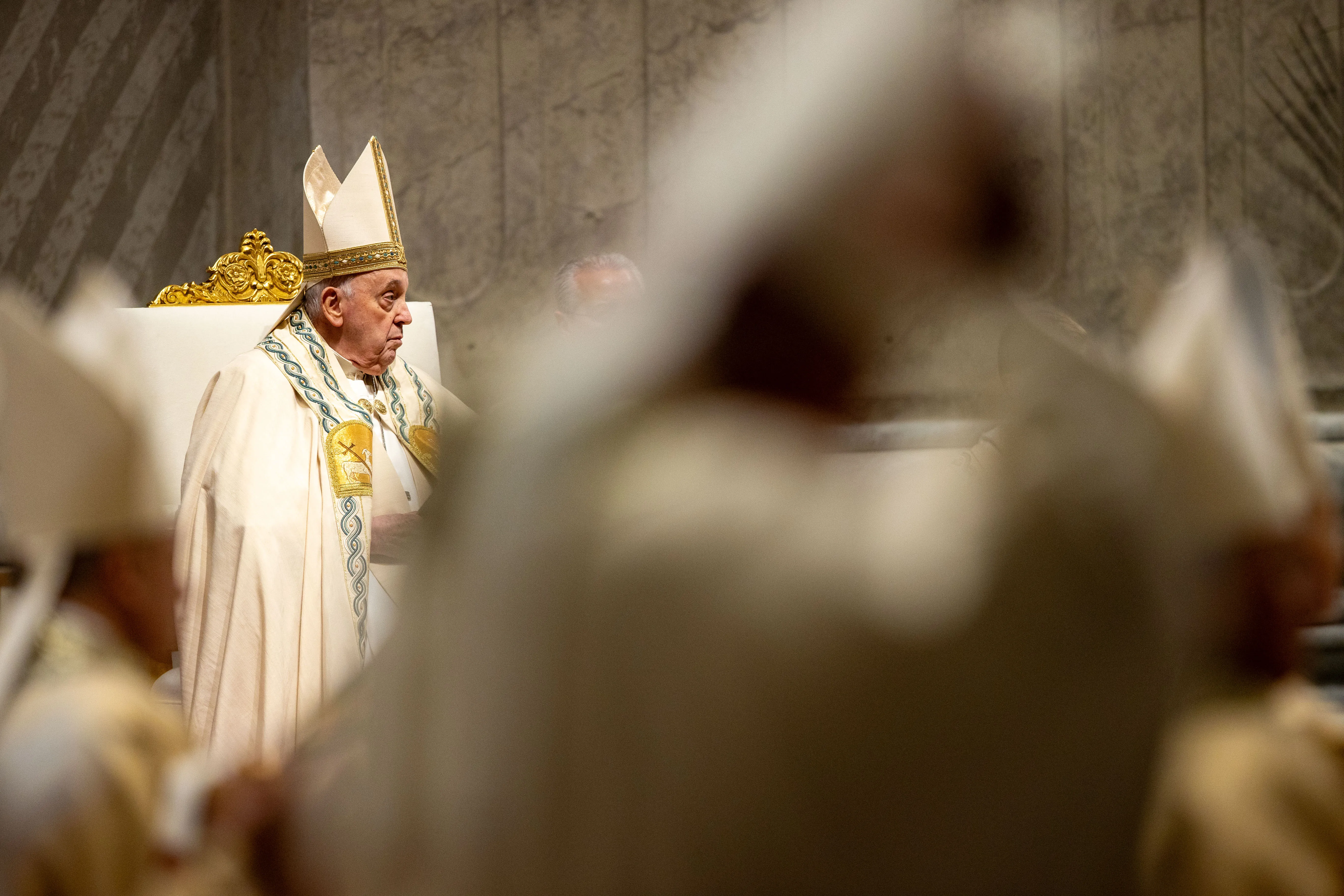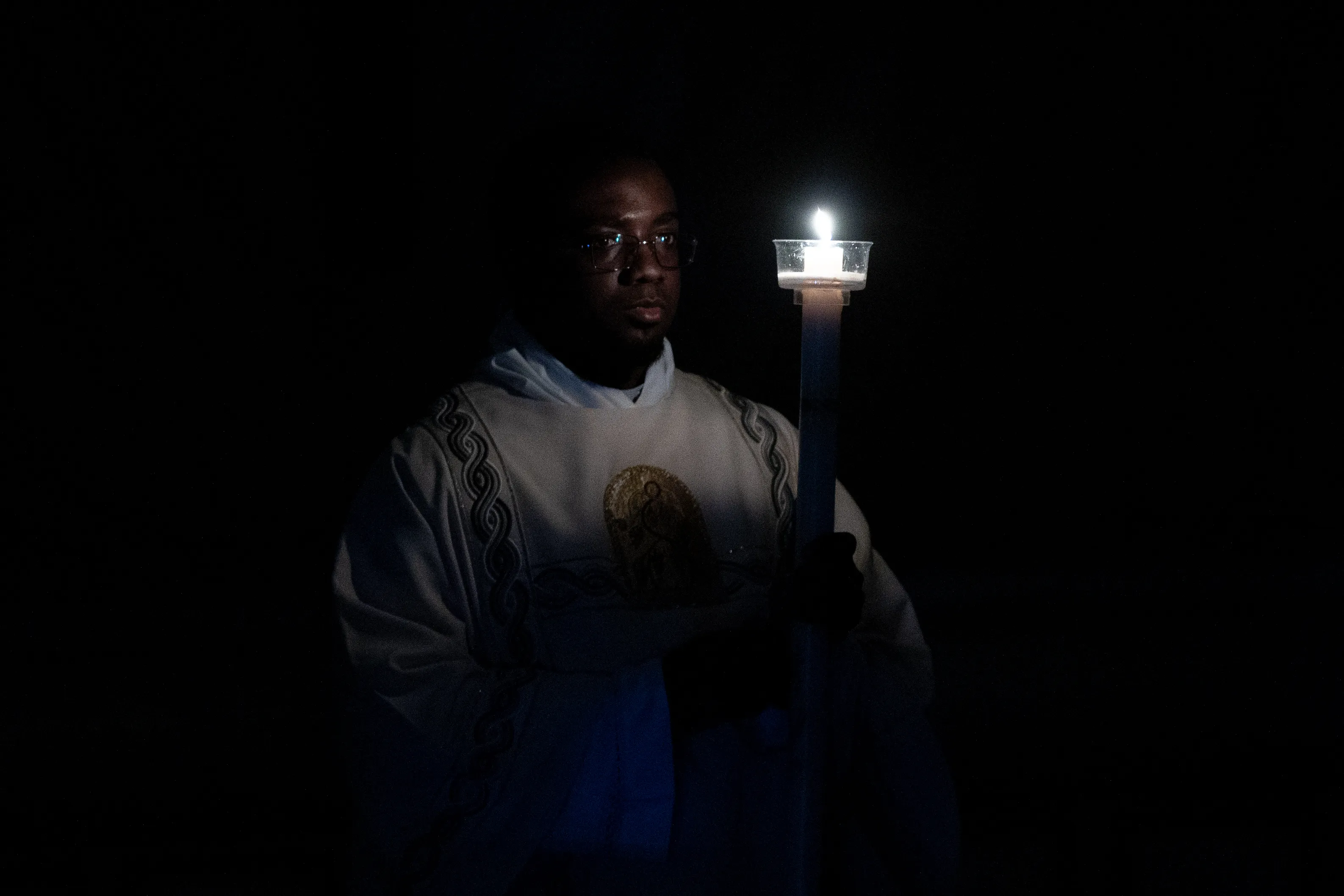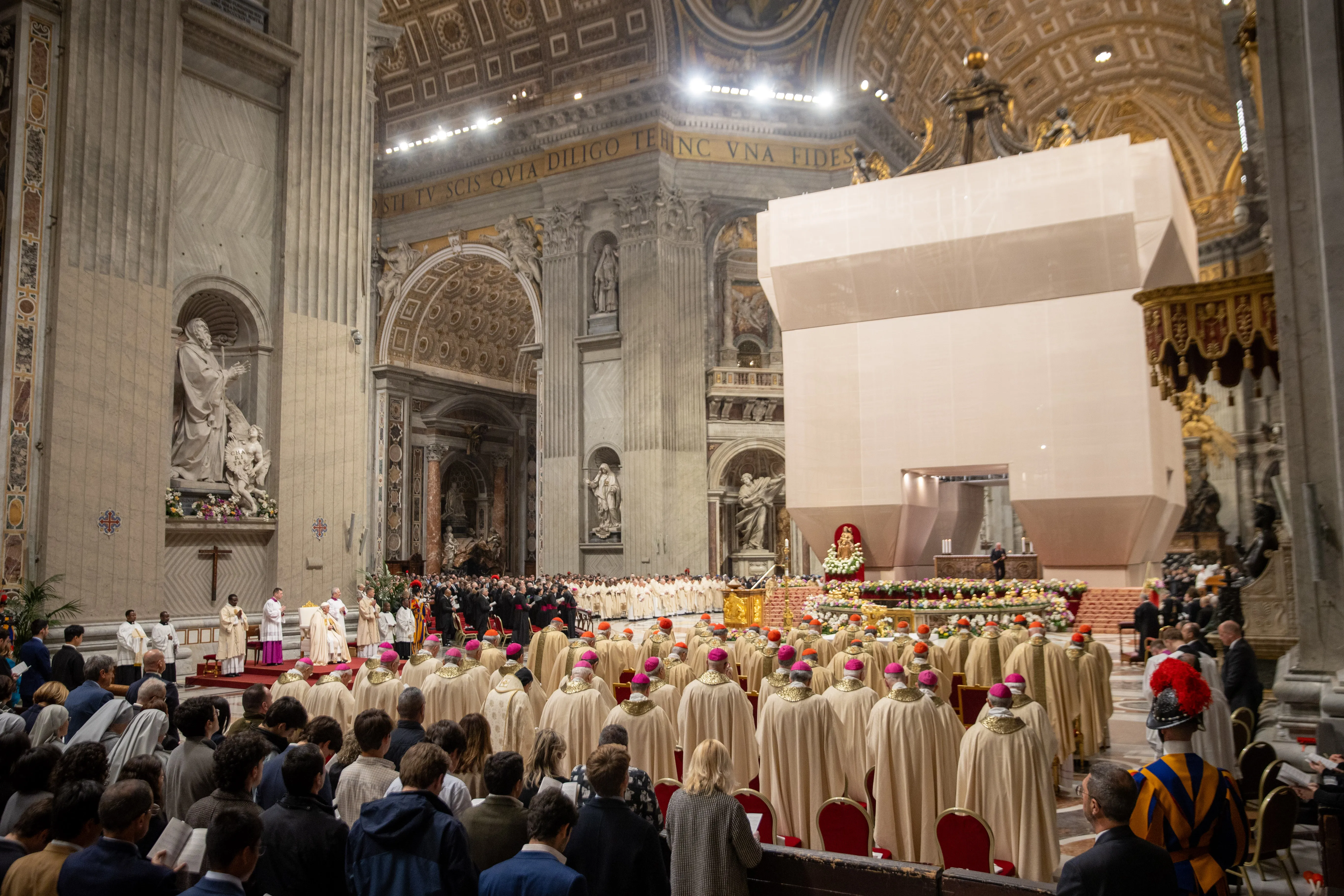
Vatican City, Apr 3, 2025 / 13:00 pm (CNA).
The Vatican on Thursday released a historical document to recognize the opening of the Council of Nicaea, convened during the pontificate of Pope Sylvester I in 325.
The International Theological Commission (ITC) published the in-depth document “Jesus Christ, Son of God, Savior: The 1,700th Anniversary of the Ecumenical Council of Nicaea” to highlight the significance of the Church’s first ecumenical council, which defended the divinity of Jesus Christ as a profession of faith amid the spread of the Arian heresy.
“This anniversary occurs within the jubilee year, centered on the theme ‘Christ Our Hope,’ and it coincides with a shared celebration of Easter for Christians in both the East and the West,” the ITC press release stated.
The commission said on Thursday that the Nicene Creed “stands at the heart of the Church’s faith.”
“It is a source of living water to draw upon even today to enter into Jesus’ gaze and, in him, into the gaze that God, Abba, has toward all his children and toward the whole of creation.”
Emphasizing that the document is not just a historical record or a “text of academic theology,” the Vatican’s theological commission said the publication responds to Pope Francis’ desire to promote fraternity among Christians and inspire greater participation of Catholic faithful within local Churches.
“It was in Nicaea that the Church’s unity and mission were first expressed emblematically at a universal level (and from here, it draws its designation as an ecumenical council) through the synodal form of that ‘walking together’ which is proper to the Church,” the ITC shared on Thursday.
“Nicaea stands as an authoritative reference point and inspiration in the synodal process in which the Catholic Church is involved today, in its commitment to live a conversion and reform marked by the principle of relationship and reciprocity for mission,” the press release stated.
Answering Pope Francis’ call to proclaim faith in Jesus Christ in a world scourged by the “tragedy of war along with countless anxieties and uncertainties,” the theological commission said the Nicaea Council publication can be used as a dynamic resource for Christian evangelization.
“The document highlights the relevance of these resources for a responsible and shared way of addressing the epochal change that is having a global impact on culture and society,” the press release stated. “The faith professed at Nicaea opens our eyes to the explosive and enduring newness of the coming of the Son of God among us.”
A special “study day” on the document will take place on May 20 at the Pontifical Urbaniana University in Rome.
If you value the news and views Catholic World Report provides, please consider donating to support our efforts. Your contribution will help us continue to make CWR available to all readers worldwide for free, without a subscription. Thank you for your generosity!
Click here for more information on donating to CWR. Click here to sign up for our newsletter.








We read: “It was in Nicaea that the Church’s unity and mission were first expressed emblematically at a universal level (and from here, it draws its designation as an ecumenical council) through the synodal form of that ‘walking together’ which is proper to the Church…”
“Walking together” as successors of the Apostles, so also and therefore excluding (!) Arianism.
The faith expressed at Nicaea is the opening revelation to the world depicting Christ as God from God, Light from Light, True God from True God. A truth that remains indelible and resistible to modification.
“The faith expressed at Nicaea is the opening revelation to the world depicting Christ as God from God, Light from Light, True God from True God. A truth that remains indelible and resistible to modification.”
As does the Filioque, which in affirming The Unity of The Holy Ghost, In The Ordered Communion Of Perfect Complementary Eternal Love, The Most Holy And Undivided Blessed Trinity, affirms the fact that there is only One Divine Son Of God, thus The Spirit Of Perfect Love Between The Father And His Only Son, Must Proceed From Both The Father And The Son, for both The Father And The Son, Exist, In Essence,
As A Communion Of Eternal Divine Love.
Well done for this magnificent and well-worded reminder!
But did you notice that the document from the International Theological Commission only mentioned the Filioque once, in order to repudiate it very bluntly?
Everything suggests that it should be sacrificed on the altar of ecumenism, and this seems to me to be an offense to the good Catholic people, an incredible regression, and I fear even worse, since it is written in paragraph 12 “The Father also gives everything to the Spirit,” which is a radical novelty in Catholic tradition, and I wonder if this might not be heresy because of the confusion it creates between the two persons, the Son and the Spirit, since they are supposed to be distinguished by their mode of procession from the Father.
What do you think?
“…repudiate it bluntly”?
As you report, the term filioque does appear only once (n.4, in connection with accurately noted “misunderstandings”), but it is hardly repudiated. For the meaning but not the term, see n. 13 “[….] he is the Spirit of the Father and Spirit of the Son (Gal 4:6; Rom 8:9) [….]”. Here’s the link: https://www.vatican.va/roman_curia/congregations/cfaith/cti_documents/rc_cti_doc_20250403_1700-nicea_en.html
Possibly more troublesome might be the initial wording about “synods” [of bishops!], but this term (appearing 51 times), too, as it is used, and as it is explicitly clarified especially in n. 113 which recalls “Apostolic Tradition” (in contrast with today’s unmentioned and mixed town hall meetings).
Also, about the filioque inserted into the Creed, here’s a history:
The filioque (the Holy Spirit proceeds from the Father “and from the Son”) was present in the ancient texts and put forth by the Synod of Aachen in 809 (I think I’ve read, by Charlemagne in response to rekindled Arianism in Iberia), and introduced universally in Rome only in 1014. It was adopted by the Greeks and the Latins at the Councils of Lyon (II, 1274), and Florence (1438-1445) where it was initially agreed that the Greek “through the Son” did not differ essentially from “from the Son.” But the Greeks back home quickly disagreed—likely inflamed in part by the long memory of the earlier destruction of Constantinople by the Latin Crusaders in 1204? (Following the loss of a weakened Constantinople to Islam in 1453, the Eastern Church has disintegrated into local national Churches.)
SUMMARY: Councils [and real synods] are what the Church DOES, not what the Church IS (Benedict XVI). How always to better do communio/ecclesial assemblies remains a distinctly different work in progress.
I note that your casual rebuttal of my assertion sidesteps three major problems:
1) The Filioque is indeed set aside by the ITC text through the quotation of a very explicit ecumenical text (in note 8), whereas this document was supposed to contribute to putting Christ, and therefore the Son of God, back at the center.
2) Even though the Filioque is set aside, the statement “The Father also gives everything to the Spirit” (in n.12) is an assertion that implicitly refutes it, which is why it makes absolutely no sense in the Catholic tradition. You will find no trace of it anywhere except in Orthodox “literature.”
3) This serious doctrinal difficulty has not been noted anywhere in the Catholic media. ND’s commentary is almost unique in linking both the ITC text and the Filioque.
I think we are faced with a serious difficulty here, and I look forward to reading your response, as I have no doubt that you will recognize the surprising nature of this observation, whatever conclusions may be drawn from it.
PS: Charlemagne was indeed responsible for the spread of the Filioque in the Christian West, but precisely because he categorically rejected the “per Filium.”
Fn. 8: “Pontifical Council for Promoting Christian Unity, ‘The Greek and the Latin Traditions Regarding the Procession of the Holy Spirit’: «The Catholic Church acknowledges the conciliar, ecumenical, normative and irrevocable value, as expression of the one common faith of the Church and of all Christians, of the Symbol professed in Greek at Constantinople in 381 by the Second Ecumenical Council. No profession of faith peculiar to a particular liturgical tradition can contradict this expression of the faith taught and professed by the undivided Church» (Eng. trans. from: L’Osservatore Romano, 13 September 1995).”
I do see your point, but it is still not clear why the ITC language about the added Filioque risks contradiction—rather than remaining a non-contradictory clarification or development.
At a general audience on Nov. 7,1990, Pope John Paul II was still able to conclude with the optimism that “the formula ‘Filioque’ does not constitute an essential obstacle to the dialogue itself and to its development, which all hope for and pray for in the Holy Spirit” (“The Filioque Debate,” in The Pope Speaks, Our Sunday Visitor, 36:2, March/April 1971). In the article—about development—he cites Gospel passages (prior to ‘Orthodox literature’) and the long history of the debate, and refers to both sides (the East: Ephraim, Athanasius, Basil, Epiphanius, Cyril of Alexandria, Maximus, John Damascene; The West: Tertullian, Hilary, Ambrose, Augustine, Aquinas).
Recalling the high point, short-lived, when a common definition was adopted by both the Greeks and the Latins in 1439: “In the name of the Holy Trinity, Father, Son and Holy Spirit, with the approval of this sacred and universal Council of Florence, we establish that this truth of faith must be believed and accepted by all Christians: and thus all must profess that the Holy Spirit IS ETERNALLY OF THE FATHER AND THE SON [caps added], that He has His existence and His subsistent being FROM THE FATHER AND THE SON together, and that He proceeds from the one and from a single principle and from a single spiration [….] We establish…that the explanation given of the expression ‘Filioque’ has been added to the Creed licitly and with reason, in order to render the through clearer and because of the incumbent needs of those times.”
My non-professional (evasive?) and overarching thought is, that within earthbound history, the culture of the West seems to need more precise and explicit clarifications, while the culture of the East remains more levitated and atmospheric. About the challenges of history in the West, the (schismatic) East remains apart from not only Florence but all of the other twenty-one ecumenical councils after the first seven.
After a thousand years, maybe there’s a place for partly cross-cultural (?) dialogue on the Filioque.
Let’s be clear: the Filioque is not “added,” it is set aside by the ITC document.
What is added is the idea, which is absolutely contradictory to the Filioque, that “the Father also gives everything to the Spirit.”
This is unprecedented in Catholic doctrine because it is incompatible with the way the Filioque has always been understood since Augustine.
Do you see the problem now?
‘ INTERNATIONAL THEOLOGICAL COMMISSION
Jesus Christ, Son of God, Saviour
1700th anniversary of the Ecumenical Council of
325-2025
Preliminary note
In the course of its tenth quinquennium, the International Theological Commission chose to carry out an in-depth study of the First Ecumenical Council of Nicaea and its dogmatic relevance today. The work was carried out by a special Sub-Commission, chaired by Fr. Philippe Vallin and composed of the following members: Mgr Antonio Luiz Catelan Ferreira, Mgr Etienne Vetö, I.C.N., Fr. Mario Ángel Flores Ramos, Fr Gaby Alfred Hachem, Fr. Karl-Heinz Menke, Prof. Marianne Schlosser, and Prof. Robin Darling Young.
General discussions on this subject took place both at the various meetings of the Sub-Commission and at the plenary sessions of the Commission itself, held in the years 2022-2024. This text was put to the vote and unanimously approved in forma specifica by the members of the International Theological Commission at the plenary session of 2024. The document was then submitted for approval to its President, His Eminence Cardinal Víctor Manuel Fernández, Prefect of the Dicastery for the Doctrine of the Faith, who, after receiving the favourable opinion of the Holy Father, Pope Francis, authorised its publication on 16 December 2024. ‘
https://www.vatican.va/roman_curia/congregations/cfaith/cti_documents/rc_cti_doc_20250403_1700-nicea_en.html